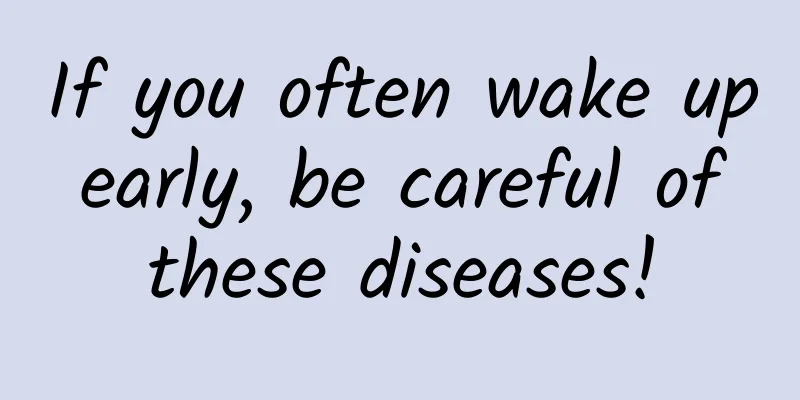If you often wake up early, be careful of these diseases!

|
Although people with poor sleep have their own sufferings, in winter, which is the best time to sleep in, people who wake up early really! Suffer! Too! Much! Much!! At three or four in the morning, when others are soundly sleeping in their warm beds, they suddenly wake up and try their best to fall asleep but cannot. Even if they can occasionally fall asleep, it is still an uneasy sleep. We all know that sleep quality is closely related to physical health. If this happens several times, we will feel sleepy, tired and anxious. In fact, this matter depends on the situation: if you are the type of person who goes to bed early and gets up early, going to bed at 9 am and getting up at 4 am, or if you just wake up early occasionally and it doesn’t have much impact on your daytime life, then you may not need to worry too much. But if you or your family members usually have a regular schedule and get enough sleep, but recently started to: Frequent early awakening✅ Wake up at least 30 minutes earlier than expected every time ⏰ It is difficult to fall asleep again after waking up🤯 My energy during the day is much worse than before🥱 Then you must read this article carefully, there are several potential health problems that you need to pay attention to. Early awakening is a typical subtype of insomnia May be related to sleep disorders When it comes to insomnia, many people subconsciously think that insomnia = lying in bed and not being able to fall asleep at night. Perhaps few people know that early awakening is actually a typical subtype of insomnia. The International Classification of Sleep Disorders (3rd edition) (ICSD-3) divides insomnia into 2 subtypes: One type is initial insomnia, which is also the difficulty in falling asleep that everyone is familiar with, such as lying in bed for more than 30 minutes without falling asleep when you feel sleepy; Another type is sleep maintenance insomnia, which includes difficulty falling asleep again after waking up at night and early awakening. For example, you originally planned to go to bed at 12 o'clock and get up at 7 o'clock, but you end up waking up at 3 o'clock every day and can't fall asleep again after waking up, or you always wake up at 5 to 6 o'clock, which is more than 30 minutes earlier than your expected time. The most common clinical situation is patients with a mixed type of these two subtypes of insomnia. However, in general, young people have a higher rate of difficulty falling asleep, and older people have more people who wake up early. About 4% to 50% of people have insomnia symptoms or insomnia disorders. A noisy living environment, high work pressure, tension or anxiety, being too full or too hungry before going to bed, drinking too much coffee, resting too much during the day, and working the night shift causing changes in circadian rhythm can all induce insomnia. There is no need to be too anxious. Having insomnia symptoms does not necessarily mean that you have insomnia disorder . Most people can quickly relieve insomnia symptoms by simply identifying and staying away from these inducing factors. But some friends may develop long-term chronic insomnia, which is a sleep problem that we need to be extra vigilant about. If you or your family members meet the following conditions, you may be suffering from chronic insomnia and should seek medical attention promptly. Content source: Diagnostic criteria reference (ICSD-3) If you don't know which department to go to, you can look into the sleep department, neurology department, psychiatry/psychology department, etc. at your local hospital. Often wake up 2 to 3 hours early Beware of depression and other emotional and psychological problems Modern people are busy and stressed at work, and it is common for them to feel low, depressed, and anxious. Moreover, many times, they feel exhausted even though they have done nothing, and their appetite and interests are affected. If you have recently woken up early and have depression, and have unexplained headaches, back pain, and gastrointestinal discomfort, it is recommended that you do not take it lightly, as depression-related diseases are not far away from us. According to statistics from the World Health Organization, there are 350 million people suffering from depression worldwide, and on average one in 20 people has suffered from or is currently suffering from depression. Sleep disorders are one of the common physical symptoms of depressive disorders, and their manifestations are varied, including difficulty falling asleep (not falling asleep after lying in bed for more than 30 minutes), shallow sleep, frequent dreams, early awakening, etc. Difficulty falling asleep is the most common symptom, while early awakening is a typical feature of depressive disorders. People usually wake up 2 to 3 hours earlier than usual and are unable to fall asleep again after waking up. The pathogenesis of depressive disorders is still unclear and may be related to genetic, neuroendocrine, social and psychological factors. In addition to making people depressed, pessimistic, self-blaming, and losing interest, it can also make our reactions and behaviors slow, and our attention reduced, seriously affecting our quality of life. Image source: Internet + author's The diagnostic criteria for depression are very strict. Early awakening is a danger signal for a depressive episode, but it is not a key factor in the diagnosis of depression. If you find that something is wrong with you, it is best to seek medical attention in time. Seeking help is the most important thing. Winter is a peak season for depression. If you feel it is very difficult to endure, you don’t have to force yourself to do something. Talk to a professional. Medication and other treatments will make you feel much better in this cold winter. Often wake up early There may also be underlying medical issues Sleep quality and physical health influence and complement each other. Disease and physical discomfort may cause us to be unable to sleep, sleep well, or not get enough sleep. Early awakening is a physical symptom that may correspond to many medical problems, the most common of which are: 1 Respiratory system related problems For example, sleep apnea syndrome, allergic rhinitis, etc. These diseases may cause breathing difficulties, affect the quality of sleep at night, and make people more sleepy during the day. 2 Chronic pain or discomfort For example, gastroesophageal reflux disease, indigestion, arthritis, diabetes or other chronic diseases may cause body pain and frequent awakenings at night, which may cause people to wake up early. 3 Endocrine related diseases For example, hyperthyroidism and hypothyroidism can affect sleep, especially hyperthyroidism. Increased secretion of thyroid hormones can lead to high metabolism and excitement of the sympathetic nervous system, resulting in symptoms such as sweating, heat intolerance, palpitations, insomnia, hunger, and weight loss. If you have these disease symptoms accompanied by early awakening, you must go to the relevant department for medical treatment in time and tell the doctor your symptoms truthfully. Actively treat the primary disease and the problem of early awakening will gradually ease. There is another situation where you may not be sure what primary disease causes your sleep problems. You can go to the internal medicine department for a preliminary examination, and the doctor will refer you for further treatment based on your symptoms. Copyright images in the gallery. Reprinting and using them may lead to copyright disputes. After checking out the disease-related factors, let’s briefly talk about the non-disease factors. In addition to environmental and dietary factors such as noise and temperature, another reason is that you may simply be old. As people age, their circadian rhythm advances, making it easier for them to fall asleep. The older they get, the more susceptible they are to insomnia. It is important to note that sleep disorders are not a normal part of aging. Regardless of whether you are male or female, young or old, as long as sleep problems affect your normal daytime life and persist for a long time, you should actively seek medical attention to find out the cause. You should also work hard to improve your sleeping environment and cultivate good sleeping habits in your life. But if going to bed late and waking up early doesn’t have any impact on your life, then don’t worry too much. The recommended sleep time of 7 to 9 hours may not be suitable for everyone. It’s also good to accept your own differences! Finally, don’t forget to forward this article to your loved ones. May everyone fall asleep until the alarm rings every night. References [1] American Psychiatric Association. Diagnostic and statistical manual of mental disorders [ M]. 5th ed. Arlington Va: American Psychiatric Publishing, 2013. [2] American Academy of Sleep Medicine. International classification of sleep disorders [ M]. 3rd ed. Darien: American Academy of Sleep Medicine, 2014. [3] World Health Organization. Depression and other common mental disorders: Global health estimates[R]. Geneva: World Health Organization, 2017: 1-21 [4] National Institute on Alcohol Abuse and Alcoholism (NIAAA). (2021, March). Hangovers. Retrieved May 6, 2021, [5] Hao Wei, Lu Lin. Psychiatry. 8th edition[M]. People's Medical Publishing House, 2018. [6] Zhang Peng, Zhao Zhongxin. Interpretation of the “Guidelines for the Diagnosis and Treatment of Insomnia in Chinese Adults”[J]. Chinese Journal of Modern Neurological Diseases, 2013(5):5.DOI:10.3969/j.issn.1672-6731.2013.05.002 [7] Chen Guihai. Research progress on insomnia[J]. Chinese Journal of Clinicians, 2017, 45(8):6. DOI:CNKI:SUN:ZLYS.0.2017-08-002. [8] Chinese Society of Endocrinology, Chinese Medical Association, "Guidelines for the Diagnosis and Treatment of Thyroid Diseases in China" Editorial Group. Guidelines for the Diagnosis and Treatment of Thyroid Diseases in China - Hyperthyroidism[J]. Chinese Journal of Internal Medicine, 2007, [9] Wang Yao. Practical Geriatrics. 1st edition[M]. People's Medical Publishing House, 2014. Planning and production Source: DingXiang Doctor (ID: DingXiangYiSheng) Reviewer: Zhao Wei, Chief Physician, Department of Neurology, Tianjin University TEDA Hospital Editor: Wang Mengru Proofread by Xu Lailinlin |
<<: Should I eat less meat if my blood lipids are elevated? Is this true?
Recommend
What to do if an accident occurs during outdoor activities? Safety first, mission second
On the morning of November 22, after several days...
Dapeng_E-commerce live streaming course, systematically learn the skills and routines of each link of live streaming Baidu cloud download
Dapeng E-commerce live streaming sales course, sy...
How much does it cost to invest in Nanchong’s marriage and love mini program?
How much is the investment cost for Nanchong Marr...
Going to work slowly, rushing off work quickly! How does the new top star walk with his head and body showing off separately!
Beijing Winter Paralympics is about to open Xue R...
After reading this, do you still think product operation is a simple job?
I have always wanted to give a systematic definit...
Meizu App Store information flow promotion, advertising placement account opening process introduction!
Meizu is a domestically produced mobile phone tar...
Why is seafood not tasty when it’s dead? For tips on choosing seafood, just read this article!
Friends who have bought seafood know that after f...
How to play the new online marketing game well?
Internet marketing has developed in the wave of t...
What should we pay attention to when developing and registering mini programs?
For individual developers 1. Make page navigation...
Don’t like bitterness? Let the machine “taste” for you first
Produced by: Science Popularization China Author:...
Does 400 number call cost money? Do I need to pay for 400 calls?
Many people think that 400 calls are free, and no...
Regarding "user growth", these may be things you don't know
Judging from the current situation, the domestic ...
Advertising tips for wedding photography agencies!
During the epidemic, the wedding photography indu...
Blizzard is online! Why do we need artificial snow?
It’s snowing again! The previous snow has not yet...
2022 Douyin Brand Live Streaming Traffic Strategy
This is the "evolution" of Douyin live ...









